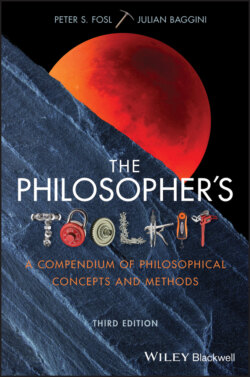Читать книгу The Philosopher's Toolkit - Julian Baggini, Julian Baggini - Страница 45
1.6 Consistency
ОглавлениеRalph Waldo Emerson (1803–82) may have written in his well‐known 1841 essay, ‘Self‐reliance’, that ‘a foolish consistency is the hobgoblin of little minds’, but of all the philosophical crimes there are, the one with which you really don’t want to get charged is inconsistency. For most purposes it’s not too much to say that consistency is the cornerstone of rationality. To do philosophy well, therefore, it’s crucial to master the idea and the practice of consistency.
Consistency is a property characterising two or more statements. If you hold two or more inconsistent beliefs, then, at root, this means you face a logically insurmountable problem with their truths. More precisely, the statements of your beliefs will be found to be somehow either to ‘contradict’ one another or to be ‘contrary’ to one another, or at least together imply contradiction or contrariety (3.10).
Statements are contradictory when they are opposite in ‘truth value’: when one is true the other is false, and vice versa. Statements are contrary when they can’t both be true but, unlike contradictories, can both be false. With contraries, at least one is false.
Consistency, like contradiction and contrariety, are about comparing two or more different statements. A single sentence can, however, be self‐contradictory when it makes an assertion that is necessarily false – often by conjoining two inconsistent sentences, such as p and not‐p (1.12). You might call such a sentence self‐inconsistent. (Compare this with the idea of the paraconsistent in 3.10.)
All this can be boiled down to a simple formulation: two or more statements are consistent when it’s logically possible for them all to be true (a) in the same sense and (b) at the same time. Two or more statements are inconsistent when it is not possible for them all to be true in the same sense and at the same time.
